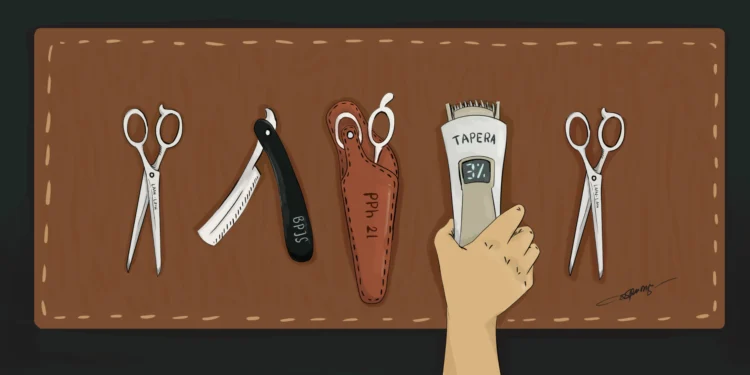The fate of minimum wage workers is getting more heartbreaking by the day. Recently, the Government passed Government Regulation No. 21/2024 (PP No. 21/2024) concerning the implementation of Public Housing Savings (Tapera). One of the rules that has become a polemic is the existence of deductions in the form of income contributions for workers, both the State Civil Apparatus, private workers, and independent workers (freelance) with the deduction mechanism being transferred to the Tapera account.
Article 5 of PP 21/2024 explains that Tapera participants are workers and independent workers who earn at least the minimum wage, and are at least 20 years old or married at the time of registration. The amount of Tapera participant contributions is 3 per cent of salary or wages for worker participants and income for independent workers. The amount of savings for worker participants is borne by the employer, which is 0.5 per cent by the company and 2.5 per cent of the worker’s wages.
This regulation certainly drew many responses, but none more than its rejection. Helmi Jauhari, a private worker domiciled in Bogor, West Java, stated that he did not agree with this policy. According to him, when his income is cut for Tapera, it will greatly impact his income. The 26-year-old man strongly objected because according to him this cut could not be evenly distributed.
“It’s not fair if all workers have to have their income cut indiscriminately.” Helmi said (30/05/2024).
In line with Helmi, Eldi, who is a worker in the textile industry sector who lives in Tangerang, also rejected the regulation. According to him, the scheme and technical deductions for Tapera contributions are unclear and the formulation of the rules is not transparent.
“The rules are unclear, not transparent, suddenly it was passed, suddenly it exists and suddenly why is it mandatory? We don’t know right? Our income has been cut by tax, cut by BPJS, now Tapera is also cut?” Eldi (30/05/2024).
Eldi and Helmi are a series of UMR income workers who reject the implementation of this policy. Their “mediocre” salaries for living in the capital must be willing to be deducted from Tapera contributions every month. Unlike Eldi and Helmi, Gian, who is a freelancer who works as a programmer and lives in Jakarta, thinks this policy will not burden him.
Gian thinks Tapera can be useful in the future because he thinks Tapera can help workers who do not yet own a house, namely by collecting a small portion of their income. “Yes, it counts as saving money, I don’t mind that the deduction is only 3%, it counts as saving money to buy a house.” Asserted Gian (30/05/2024). However, he also realises that the implementation of Tapera for all workers will burden the community. According to him, there needs to be clearer rules regarding the collection and allocation scheme, so as not to cause confusion in the community.
Compiled from various sources, based on the provisions of PP Number 21/2024, Tapera participants are workers who receive wages or salaries, including civil servants, state-owned enterprises, independent and private workers. Tapera participants who fall into the category of low-income people (MBR) can obtain benefits in the form of home ownership loans (KPR), home building loans (KBR), and home renovation loans (KRR). These benefits are accompanied by long tenors of up to 30 years and fixed interest rates below market interest rates.
Problematic Policy?
The director of the Pratama Institute for Fiscal Policy and Governance Studies, Prianto Budi Saptono, stated that the Tapera policy is not new. According to him, the provisions regarding Tapera have existed since 2020, as stipulated in PP 25/2020.
“The provisions regarding the amount in Article 15 paragraphs (1) and (2) of PP 25/2020 above did not change when the PP was revised with PP 21/2024. The revised regulation does include Article 15 of PP 25/2020, but does not change the amount of deposits,” Prianto Budi Saptono told Tirto on Tuesday (28/5/2024).
As quoted from the Tirto.id page, Prianto considers that the Tapera savings deduction above is not an additional burden for workers. Because it is in the form of savings that can later be disbursed by workers when they want to buy a house. In addition, the implementation also does not start on 20 May 2024, but since 20 May 2020.
Based on a simple calculation simulation using the Jakarta UMR (Rp5.06 million) as a benchmark, then multiplied (deducted) by the Tapera contribution of 2.5%, the contribution collected from the salaries of workers in Jakarta is Rp126,610 per month, which if multiplied for 12 months, the total contribution collected is Rp1.5 million. Let’s assume that an employee with a minimum wage wants to buy a house in the Depok area in West Java. Reporting from Rumah 123.com, the cheapest price for houses in the Depok area currently reaches 500 million. So an employee needs more than 100 years to be able to buy a house at that price.
Although it is not an additional burden for employees, the fact is that many parties from the employer and worker sectors object to this policy. The Indonesian Employers Association (Apindo) is a group that firmly rejects the regulation. Quoted from Antara, the chairperson of Apindo, Shinta Kamdani, stated that Apindo firmly rejects the implementation of the Tapera regulation.
“Since the emergence of Law No. 4/2016 on ‘TabApindo with Public Housing Support’, Apindo has firmly rejected the enactment of the law,” Apindo Chairwoman Shinta Kamdani said in an official statement in Jakarta, Tuesday, as quoted from Antara.
In line with Apindo, the Confederation of Indonesian Trade Unions (KSBSI) through its chairperson Elly Silaban, considers that Tapera contributions will only add problems and burdens to workers. Quoted from Tirto.id, Elly said that currently, labourers are already bothered by guarantees in the form of mandatory contributions and taxes that cut their wages. She thinks the Tapera policy will be massively rejected by labour unions.
“This seems to be forcing, can’t it be forced [to join Tapera]? How about those who are already at home, if they are obliged too,” Elly said, Tuesday (28/5/2024), quoted from Tirto.id
The main problem behind why this policy is so problematic is because the imposition of contributions is mandatory for all workers from various sectors, aka being hit equally. Many observers consider that the implementation of Tapera should not be evenly distributed or target all groups of worker.
Quoted from Kompas.com, financial planner, Andy Nugroho, said that this rule should not be generalised.
“If you already have a house and do not want to add a second house, there is no need to cut it for Tapera,” he said on Thursday (30/5/2024), as quoted from Kompas.
He added that people who still have an income equivalent to the UMR or even below will object if their income is cut again by 3% for Tapera contributions. For this reason, according to him, the rule cannot be applied equally.
“For me, the goal is okay, but when talking about the ideal, again, the rules cannot be generalised,” he added, quoted from Kompas.com.
Potential Decrease in People’s Purchasing Power
This programme also has the potential to erode people’s purchasing power, especially middle-class workers. Although the percentage looks small, for many workers, especially those in the lower-middle income bracket, this cut can have a significant impact on their ability to fulfil their daily needs. Meanwhile, with the rising cost of living and urgent needs such as food, transport, education, and health still need to be met, a reduction in income will directly impact their consumption ability. This policy also does not take into consideration the differences in income levels across sectors.
For lower-paid employees, the 2.5% cut from their salary can feel particularly burdensome compared to higher-paid employees. Thus, the negative impact on purchasing power will be felt more by the more financially vulnerable groups.
Senior Economic Policy Analyst at the Institute for Fiscal and Governance Gustofan Mahmud stated that Tapera has the potential to reduce disposable income or take home pay, which will certainly reduce public consumption figures. According to him, the purpose of Tapera is also still unclear.
“What is the purpose? Is it to overcome the housing backlog or for what? Actually, if the housing backlog is there is already a subsidised mortgage aimed at people with low purchasing power, then what is the purpose of Tapera?” Gustofan said (31/05/2024).
Gustofan added that no party would benefit from this policy. According to him, if compared to BPJS employment and health, its implementation is still clearer than this Tapera programme.
Gustofan added, “What is the position of Tapera? If BPJS is clear, it can be used if we are sick, or if we are laid off, it can be taken for living needs, Tapera is for what? The money cannot be taken, it must be used to buy a house, right? This means that there is a loss of welfare, the money that comes out of workers and employers is for what and for whom? Is it for workers, employers, or the government?” Gustofan said (31/05/2024).
Government Response
Quoted from various sources, the Director General of Industrial Relations (PHI) and Social Security of the Ministry of Manpower (Kemnaker), Indah Anggoro Putri, said that the Tapera provisions will indeed be mandatory for all employees. Including private workers, employees of BUMN, BUMD, ASN / TNI / Polri and BUMDes as stated in Law 4/2016 concerning Public Housing Savings. “Later, technical rules for private workers will be regulated in a Minister of Manpower Regulation,” said Indah.
“Tapera aims to collect and provide sustainable long-term low-cost funds for housing finance in order to meet the needs of decent and affordable housing for participants,” Indah said (28/5/2024). Meanwhile, for workers who already own a house, Tapera can be used as a renovation fund. Putri also stated that for those who already own a house, Tapera funds can be taken when the participant retires or the end of the participation period. For private employers, it is reminded that they must register their workers as Tapera participants no later than 2027.














